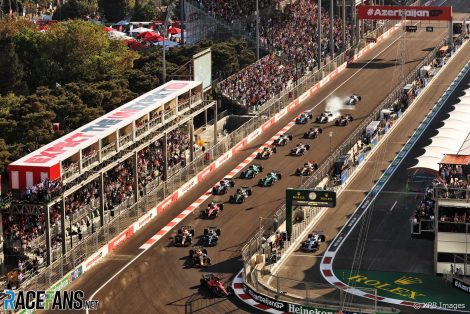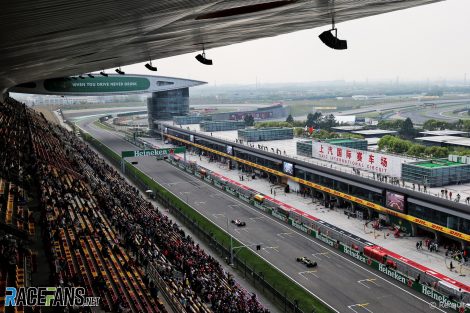Formula 1’s target of becoming a net zero producer of carbon by 2030 has always been in conflict with the financial benefit of holding more races.
The 2024 F1 calendar, which features a record-breaking 24 grands prix, therefore looks like a step backwards for the series’ sustainability. More rounds means more travel – and therefore more emissions.That is undoubtedly true as far as the raw count of races is concerned. But F1 has been seeking improvements in how it organises its calendar to reduce the amount of travelling it does. The changes in the 2024 schedule show the latest steps they’ve made in that direction, and indicates further gains which may come in future calendars.
As F1’s 10 Europe-based teams now spend around two-thirds of the season outside their home continent, grouping the fly-away races together makes obvious sense. But while lumping all the races in each continent together may seem an obvious fix, there are reasons why this can’t be done immediately, or at all.
One of the most obvious examples of this, which F1 has not been able to fix for 2024, is its multiple trips across the Atlantic. It stands to make huge savings in freight by combining more of these, yet next year again it will make separate crossings over consecutive months in May and June for races in Miami and Montreal, returning for a pair of European rounds in between.
F1 needs to “be more conscious that we are not moving back and forth all the time” and rationalise its calendar, acknowledged Haas team principal Guenther Steiner. However he noted “there’s a few races we cannot do without doing that because obviously there are long-standing contracts in place in the moment.”
This is the case in terms of the Miami and Canadian grands prix. The latter inked a new long-term deal six years ago which will keep it on the calendar until 2029. Adding a race in Miami was a top priority for Liberty Media and it has just held its second race in a 10-year deal. But when the time for new negotiations eventually comes F1 will face the same challenge of reconciling the two events’ date preferences, the Montreal promoters being unwilling to move earlier in the year when temperatures are cooler.
Advert | Become a RaceFans supporter and
“It will take time to get it really regionalised,” Steiner reflected, stressing F1 CEO Stefano Domenicali is “working on it to make it even better than it is now”.

Domenicali has repeatedly said he intends to fix the calendar at its current limit of 24 races. Within that limit, it’s now up to F1 to strike the best possible balance between the quality of the events it puts on, the diversity of countries it visits (the continent of Africa, which last held a race 30 years ago, remains a notable absence), the income those races brings in and the sustainability of its championship.
When it comes to the latter, simply arranging the races into a more convenient order is one of three aspects F1 considers, as F1’s head of environment, social and governance Ellen Jones explains.
“The first is distance travelled, the second is the mode [of transportation] and the third is the amount which travels,” she says. “We have to answer on all three of those.”
F1 has already begun reducing the amount of freight it takes with it around the world. One significant example of this is the creation of its Media and Technology Centre at Biggin Hill in the United Kingdom, which handles the production and distribution of all its television broadcasts and other digital coverage. Its on-site production facility has been trimmed back as far as possible, drastically reducing the amount of equipment it carries around the world to cover each race.
Advert | Become a RaceFans supporter and
For the freight they still have to take, F1 has considered the best means of transporting it: “Can it go on a sea freight solution?” says Jones. “Can it go in a regional hub?”

“It is also a partnership with our promoters. When you have a calendar and a date, it can be a very emotive topic: ‘It’s a holiday, it’s always been that…’. But we need to bring them on that change journey with us so that we can host more sustainable events, reduce our carbon footprint and balance all of those variables.”
F1 trumpeted “big steps forward in regionalisation” with its 2024 calendar. But there are few major changes in the arrangement of the events compared to this year, besides the date swap between rounds in Japan and Azerbaijan.
The opening trio of events are grouped together. The pre-season test in Bahrain, season-opening race at the same venue and round two in Jeddah one week later means F1 spends the opening weeks in the Middle East.
After that a succession of races are held in far-flung locations two weeks apart: Melbourne in Australia, Suzuka in Japan, Shanghai in China and then that first visit to the USA. When so many personnel are flying out for one race, would it not make more sense to allow them to travel immediately on to the next event?
Advert | Become a RaceFans supporter and
But as Steiner points out the movement of freight between those races potentially offer greater savings. “I think the biggest thing the materials are going straight on to the next one, it’s a shorter flight,” he said. “Some people maybe even stay out there. Some of the team, the set-up crew, I don’t think they fly back because they need to be there on a Saturday, Sunday, the week after.”

F1 then has a run of eight European races, interrupted only by the flight to Canada, which has become the most conspicuous obstacle to its ‘regionalisation’ goal. The rescheduled Baku race is more sensibly positioned on the way to Singapore. It is followed by a quartet of races in the Americas and a pair of races in the Middle East.
The logic of adding a third US race one month after another race in the same country is doubtful. But here too it’s a case of commercial desires versus sustainability goals. In order to make a Las Vegas race happen, F1 had to accept a late November time slot.
With its 2024 calendar, F1 has finally achieved its goal of expanding the schedule to 24 rounds. Whether these all go ahead is another matter, of course. It planned two dozen events this year but Covid-19 and flooding scuppered those at Shanghai and Imola.
The 24-race figure is significant as it is the maximum F1 can arrange under its agreement with the teams. It therefore has additional leverage over those who wish to join the calendar, or retain their places on it, to accept its preferred timings in order to make future schedules even more efficient. The latest schedule may be only a modest step, but it is part of a general trend in the right direction as F1 pursues its goal of becoming carbon neutral by 2030.
Advert | Become a RaceFans supporter and
Become a RaceFans Supporter
RaceFans is run thanks in part to the generous support of its readers. By contributing £1 per month or £12 per year (or the same in whichever currency you use) you can help cover the costs of creating, hosting and developing RaceFans today and in the future.
Become a RaceFans Supporter today and browse the site ad-free. Sign up or find out more via the links below:
2023 F1 season
- FIA president cleared of alleged interference in two 2023 races
- First week viewing figures for new Drive to Survive season fall again
- Max who? Drive to Survive season six prefers its favourite faces
- RaceFans’ complete 2023 season review
- The F1 drivers who pulled off the 10 biggest charges through the field in 2023





Jere (@jerejj)
18th July 2023, 14:06
Next season’s race calendar is indeed a good step in the right direction, but once again, while 24 itself is perfectly okay, I wish FOM & FIA would use realistic opportunities to avoid triple-headers altogether (something they should’ve started doing already when COVID stopped truly affecting matters) to make the seasons at least a little more bearable for the travelling people as a minimum consideration for their sake.
Regarding some specific aspects, not much argument against racing in Montreal in May anymore, given how warm that month has mostly been in the recent past, especially the latter half, but even towards the middle, i.e., a week after when Miami GP occurs next season, while for the LV GP, a weekend before Thanksgiving weekend seemed to be the choice for the time being, but Thanksgiving weekend itself also proved to be okay, after all, although still a bit silly to have that event separately from COTA-Mexico City.
Finally, China’s complicated custom logistics are the actual reason for not holding the Japanese & Chinese GPs on consecutive weekends rather than precaution for an entirely non-existent chance of another COVID cancellation, given China dropped its zero policy last January.
Chinese GP has simply been unable to form a double-header with any other circuit regardless of travel distance for a little while, but hopefully, again someday so that race calendar formations would be even easier, although this doesn’t mean the Australian & Japanese GPs couldn’t form a double-header, as a standalone Australian GP is another negative aspect & something even some drivers or at least Russell has pointed out.
Moshambles (@moshambles)
19th July 2023, 8:30
Like all corporate entities, they’re not actually concerned with their impact on the climate but rather their messaging and perceived impact. Net zero is laughably impossible for F1, no matter how much “offsetting” they do. In spite of all this, I do welcome F1 doing as much as possible to actually lessen their impact, just don’t care to hear all the BS
catalogosmx
19th July 2023, 17:08
As sports change over time, did it become a zero carbon product? Well, that’s a goal, but I’m more of a classic. It seems that sustainability came to Formula One. I still remember when the auspices of cigarettes disappeared. I just hope there is no Formula One for electric cars.
Senna vs Schumacher
19th July 2023, 17:55
Now for regional champions as well. What about crowning a European or Middle-East F1 champion for any given season.
some racing fan
20th July 2023, 7:29
The wrench in the works of this is Singapore. They apparently don’t want to move their date. If they could move to March or April, then you could have all the Far-Eastern hemisphere races in the spring and the regionalisation would be complete on that end.
some racing fan
21st July 2023, 4:41
The most ideally regionalised calendar (with some deviations, and no restrictions (no Ramadan, no races not wanting to move) would be this;
1. Miami (26 February)
2. Bahrain (10 March)
3. Saudi (17 March)
4. Qatar (24 March)
5. China (7 April)
6. Suzuka (14 April)
7. Vegas (28 April)
8. Imola (12 May)
9. Barcelona (19 May)
10. Monaco (2 June)
11. Hungary (9 June)
12. Baku (23 June)
13. Austria (7 July)
14. Silverstone (21 July)
15. Zandvoort (18 August) (earlier break because of Paris Olympics)
16. Spa (1 September)
17. Monza (8 September)
18. Montreal (22 September)
19. Interlagos (6 October)
20. Austin (20 October)
21. Mexico (27 October)
22. Abu Dhabi (10 November)
23. Singapore (17 November)
24. Australia (1 December)
Prashanth Ramadas
21st July 2023, 0:04
Vettel only wanted to win = This was his only motive.